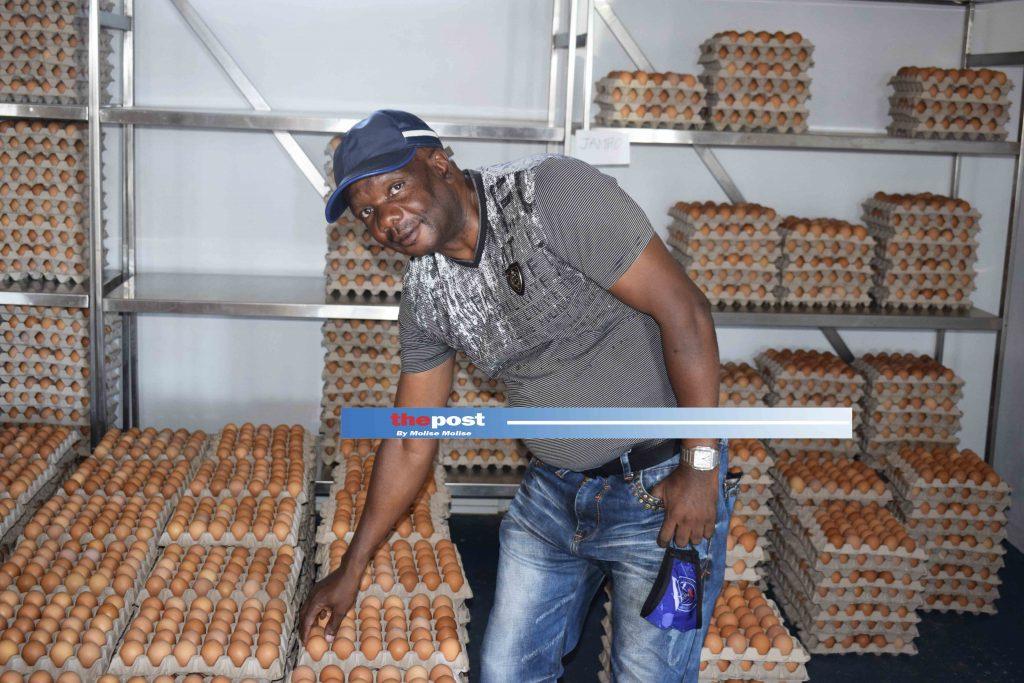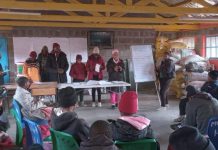Africa-Press – Lesotho. POVERTY has levels. Bishop David Ramella wasn’t poor but wretchedly poor. That is to say he was poorer than poor. A good day for him and his two siblings was when his maternal grandmother mixed papa and fish oil for dinner.
It was enough for them to fill tummies and imagine the aroma of fish in the oil was fish. On bad days they would sleep on empty bellies. There were many such days.
Their home in Mahobong was a mud house precariously clinging on the ground it stood. That it didn’t cave in and crash them was a miracle they witnessed every day.
Tattered clothes were what covered their essentials. There were no shoes to talk about. School was several miles away, a journey they routinely endured barefoot while their little bellies grumbled of hunger.
There were no cattle for Ramela to tend. The only time he ventured into the veld was to either while up time with other boys or to herd the cattle of a neighbour whose grandmother either owed or had promised her some mealie-meal.
Christmases were not joyous moments of feasting, presents and new clothes. A tiny portion of rice and a piece of chicken amounted to what they called a memorable Christmas meal.
And that was if his grandmother moved mountains to get to cobble up such a meal. Try as she may, she often failed. Otherwise, that was that: A few hours of reprieve from the grinding poverty that was their way of life.
Ask Ramela about his childhood memories of the festive holidays and he will take you back to a painfully sorrowful moment in December 1977 when he was 12.
Throughout the year he had looked forward to the brief return of his mother who worked in South Africa. Although a maid, she always tried to bring them some clothes and food for Christmas.
This time she was not coming. She was dead. Ramela, his sister and brother were gutted. From then on, they were on their own with their grandmother. No longer could they look forward to the little their mother sent from Soweto.
Their Motswana father, a mechanic, had long left. Orphaned, their miserable lives took a turn for the worst. Sometimes they would steal maize cobs from fields in the village but their religious grandmother made sure that never became a habit.
“She would always tell us that we should never allow hunger to make us what we are not,” Ramela recalls.
The granny, who owned a church, always kept them on the straight and narrow. Church on Sunday was not optional: you either attend or go hungry for the day.
When she mixed the papa with fish oil, she would always tell them that they are not any different to those who ate meat or milk. “She taught us to appreciate what God had given us despite what we were going through”.
That spiritual and emotional nurturing has remained with Ramela and shaped him. His pitiable childhood is however only a small chapter of his life. Now 56 and seven children later, Ramela has had moments of regret, shame and failure.
There have been moments of spectacular success in both business and religion. He talks about all those with humility. Mistakes are admitted, failures acknowledged and shame noted.
Success is attributed to God and not hard work, cleverness or talent. And that is what makes him different to other successful people wont to hog all the credit for their achievements.
Often, they exude pride that borders on arrogance. The acclaim is all theirs and rarely do they admit that there were some people, and possibly some divine intervention that was the wind in their sail.
Yet in life, not everything is entirely within your control. Ramela refuses to take that tempting route. “I am what I am because of God,” he says. To aptly illustrate his journey to success you have to look at his childhood and what he has become now.
What happened in-between are building blocks that have been gradually staked through chance, faith, determination and learning from mistakes. What he is now is not just a businessman who is a cleric but a man giving back to the community and country that raised him.
The ‘now’ is April 9, 2021, when we meet for an interview that has been postponed several times because of his tight schedule. In Mahobong stands a sprawling complex of a filling station with a supermarket, convenience store, a café and a wheel alignment centre.
It majestically appears out of nowhere, right in the middle of the villages and somewhat incongruent to its surroundings. Walking in its grounds is a dark-skinned man in a T-shirt and cap.
So conspicuous is he that you might mistake him for one of the groundsmen. But this is Ramela who owns Thakadu Filling Station. Thakadu, which is Ramela’s first name, is an anteater.
The filling station, which is functional but still a work in progress, is only one of several businesses he owns. For more, take the south-eastern direction on the road that passes Thakadu filling station, drive for a few kilometres and turn to the dirt road on the right.
Keep on it until you pass the Tsuinyane River. Drive a little bit on the meandering road until you see a massive compound of factory-like structures made of corrugated iron.
You are now at Thakadu Poultry. Ramela owns that too through his Ramela and Associates company. He insists the project is “just starting” but one of the fowl runs is already daily spewing 9 000 eggs supplied to the major retail shops.
By the end of May that number would have doubled to 18 000 before increasing to 27 200 in June. Across the chicken farm is a police station Ramela is building.
Perched on a plateau behind the station is the old people’s home he sponsors. Thaba Phatšoa Primary school, his alma mater, has a hall and a computer lab he also built.
He has also built classrooms at another nearby school. As you drive through Mahobong and Kolonyama swathes of maize, sorghum and beans sandwich the twisting road.
Ramela doesn’t own those fields but he is part of their story because he is in crop-sharing partnerships with their owners. He has tilled the land, sowed the seeds and provided the labour.
The deal is that he will get 60 percent of the harvest while the owners, whose main role is to look out for thieves and livestock, keep the remainder.
It’s hard to find a downside to this arrangement. Most of the fields had laid idle for years after the owners failed to raise the capital to put them to good use.
Those who tried to till the land have often failed to harvest enough for their sustenance because they cannot afford fertilisers, the right seeds and labour. Ramela can afford to buy spans of land in the countryside but he doesn’t.
“I understand their life is in the land and just because they cannot afford to farm doesn’t mean they have no use for the land,” he says of his decision to partner with the villagers instead of buying their land.
“I remember asking them what they thought would feed the nation and some of them said it was money but I told them that it is the land that feeds the people.
” Ramela wasn’t always drawn to farming but circumstances pushed him. When he was young those fields had crops.
But when he returned from South Africa, where his success started, he found the land fallow. Crop production had plummeted. His people were starving even though they had land.
What he saw was a result of a steady decline in agriculture production. In the 1980s, when Ramela left for South Africa, Lesotho produced 80 percent of its cereal consumption but now that number had dropped to 30 percent.
Villagers who used to produce enough for themselves and to sell were now struggling to buy food. Ramela saw the ravages of hunger first-hand among the children in his community and he wanted to help.
He had three options. He could donate food, give the people jobs or partner with the farmers. “I wanted to help the people have enough food but realised it was not enough to just give out donations.
I had to teach the people to produce for themselves. The crop sharing comes with training in new farming methods. ” He didn’t come back home because his roads in South Africa had reached a dead-end.
He came because he wanted to make a difference. “That is important to me as a servant of God. ” Incidentally, Ramela spent the first 10 years of his childhood in South Africa where he was born.
His mother sent him to Lesotho when he was mixed up in the youth riots sweeping through South Africa in reaction to the vile apartheid regime’s Bantu Education in 1976. He was politically conscious despite his age.
Speeches by political activists at his school had sparked the fire in him and he joined the groups that torched property and marched the streets in brazen defiance to the system and those who enforced it.
Fearing for his life, his mother carted him as well as his young siblings to Mahobong. “She saw the passion in me and she thought I was too young to partake in the politics of those days,” he recalls.
When their mother died, his brother, who had remained in South Africa quit his job to fend for the family. It was that brother who later took him to secondary school after he had spent a year at home despite doing well in primary.
Ramella would follow that brother in South Africa after high school. But things quickly went haywire. Within a few years, Ramella had become a father.
A young father with no means to sustain his child. He was ashamed of his misdeed. “My brother had called me to South Africa to work and help him feed the family but I had only disappointed him.
Here was a brother who had left school to work to feed us but I was bringing him more grief instead of helping him. ” Ramella however quickly imbibed the lessons of that episode and hunted for a job.
While a petrol attendant, his first job, Ramella studied management courses at Damelin College. Soon he was working as a clerk at a police station in Protea.
Promotion to the station’s canteen would however briefly land him in jail when he took his benevolence as a clerk work too far. In his shift, he would give the canteen employees rations of meat.
He reasoned this would stop the workers from stealing. He says he was right because his shift never reported any theft. The only problem was that it wasn’t his place to be handing out stakes.
So, a Captain said he should be arrested and charged. He was only saved by a Brigadier who refused to lay charges. The Captain relented but kept the grudge.
He would revive the case when he was promoted and replaced the brigadier who had been transferred. Ramella was convicted and sentenced to two years behind bars.
“I remember screaming in court. They had given me two years as a first offender and that was unfair because I had not stolen from the police station. ”
He was in jail for a week until his conviction was overturned on appeal. “I rejected a request to return to work because I knew the boss hated me. ” Within a few weeks he was packing shelves at Pick n’ Pay as a merchandiser for Brand Pack.
It was a job that would thrust him on a path to success. Up the ladder, he climbed, first as a supervisor and then area manager. Then one day his boss called him to his house for what turned out to be their last meeting.
The boss, who during the meeting had promised to make him a rich man one day, had died a few hours later. The boss’ wife took over while Ramella remained in charge of the operations.
But they soon fell out when the boss’s new husband started interfering with the management and hiring his children from the previous marriage. In 2002 the company was on the brink of collapse and owed M2 million in taxes.
Ramella mortgaged his house to get the M2 million loan to pay off the taxman. In exchange, he acquired 60 percent of the company. When relations soured five years later, he bought her out completely to become the only shareholder.
He rebranded the company to Dikgabo Di Kopane (DDK), a name that was a homage to his totem of a small monkey. “Because I hired and promoted my fellow merchandisers, I was saying we are small monkeys that have come together”.
DDK is the sole merchandiser for Coca-Cola products in South Africa. The relationship that started when it was still Brand Pack has helped the company grow from 80 to 6 000 employees.
The Covid-19 pandemic has shaken the company a bit and triggered some job cuts but it remains strong. “We work as partners. I tell the merchandisers that they are Coke’s brand ambassadors.
You must build relationships on trust,” he says. He says his relationship with the former business partner taught him “to take control of my affairs”.
“If you have a vision and people are an obstacle you have to buy them out so you can build your brand.
” That might sound ruthless but it’s pragmatic, especially when visions don’t align.
You can either hang on to a relationship that pulls the business down and sabotage your vision or dump it. He could have walked out but there was too much at stake.
Although Ramella was ordained as the Reverend of St Paul’s African Apostolic Church in 2005 it would appear that his ordination had been confirmed when he was a young boy.
As he explains it, a pastor had told the church he was the boy who would lead them. His family on both the father’s and mother’s side were deeply rooted in Christianity.
His mother was a singer at the same church. The granny who raised him owned a church. His father’s mother was so strict about attending church that whoever skipped it would face her wrath.
Being a clergyman who is a businessman might sound like a queer combination but Ramella doesn’t see any conflict. “The two don’t mix. You can run a church like a business but you cannot manage a business like a church.
” Yet he insists the mission should be the same because “business can help you do God’s work and help his people”.
The important thing, he says, is to “remain rooted in the word of God and be humble”. “You have to understand you are a manager of God’s things. In essence, God uses you to be a business person to look after his people.
I am chosen by God to serve his people. ” “It is not about me but God’s children. It’s all about empowering people and changing lives. As a servant of God, it feels good when you change lives.
” Ramella says he has no political ambitions of any sorts. Instead, he is disappointed by men of the cloth who dabble in politics. “People forgot who they are.
They forget their purpose in this world is to preach and give hope. People who are supposed to be serving the Lord are also in politics. Politicians need to know they have been chosen by God to serve.
Now you see priests forming parties. I see people hungry for money and power. ” “I am content serving my God who guides me. When you serve God, you are never afraid that anyone will turn against you.
“Our job as pastors is to preach peace and hope. We need to be going out there and giving hope and sharing the good stories. ”
His insanely busy schedule of community work and business sometimes keeps him away from his family for days but he has devised a way to spend time with them.
Sundays, he says, are days to serve the Lord and be with family. Every year the family has an uninterrupted two-week vacation. He watches soccer and cricket. Kaizer Chiefs is his favourite team.
For More News And Analysis About Lesotho Follow Africa-Press






